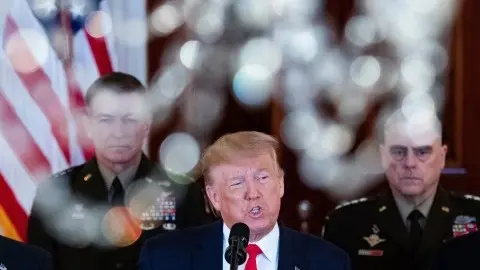UK: Big changes coming as EU trade talks loom
Prime Minister Boris Johnson's decision not to extend the 11-month post-Brexit transition period means negotiators have their work cut out to agree a basic free-trade deal this year. The UK-EU trading relationship may well change at the start of 2021, but we may not know exactly how until later into 2020, setting up another uncertain period for the economy
Negotiators face an uphill battle to get a free-trade agreement this year
December’s landslide election victory for PM Johnson means the UK will now almost certainly leave the EU at the end of this month.
But when it comes to the future relationship, things are still foggy – both in terms of what form the agreement will take, and how long it will take to negotiate.
On the latter, it looks increasingly likely that the UK won’t ask for an extension to the transition period – the standstill phase currently set to last until the end of 2020.
A basic free-trade agreement (FTA) in goods might just about be feasible by the end of 2020
That sets up a challenging, but perhaps not impossible, task of reaching some form of trade agreement by the end of the year.
Most trade experts think a basic free-trade agreement (FTA) in goods might just about be feasible by the end of 2020 – if (and it is quite a big if) the UK signs up to most of what the EU asks for. Those demands are likely to include ‘level playing field commitments’ – rules that ensure the UK cannot try to undercut the EU on things like workers' rights and state aid. Fishing rights are also likely to be fairly high up the wish-list.
But even if the Prime Minister accepts these demands – which is likely, but not a given – then the UK economy could still face steep changes to its trading relationship with Europe at the start of next year.
Expect changes to the UK-EU trade relationship in 2021
Free trade in goods does not mean frictionless trade, and businesses face the potential for higher costs and more paperwork. To qualify for zero tariffs, firms will need to prove their goods are sufficiently UK made. It’s often cheaper and easier to simply pay the default higher tariff than it is to spell out where various components originate.
A basic FTA is also unlikely to do much for services, which represent 80% of the UK economy. The jury is out on just how far either side might be willing, or legally able, to cushion the blow when the UK leaves the single market next year.
If nothing else, both sides are aiming to agree equivalence for financial services by June, as well as a data adequacy agreement later this year. It is possible that other ‘patches’ might be found too, but the fact is there will almost certainly be new market access restrictions for UK services.
In short, there are plenty of Brexit-related questions to be resolved during 2020 – and with most issues unlikely to be resolved until fairly late in the day, there won’t be quick answers.
Tentative evidence that Brexit uncertainty has fallen among firms since the election

Another tricky year for the UK economy
For the UK economy, this means another year of uncertainty.
Admittedly, the first few survey readings since the election suggest firms are turning a little more positive on the outlook. Business optimism was the highest since September 2018 according to December’s services PMI, which was coupled with a rise in new orders.
On that basis we certainly wouldn’t rule out a modest increase in capital spending in the near-term, particularly where the time horizon is fairly short. If this optimism does translate into slightly better short-term growth momentum, then that may help prevent the jobs market from slipping into a more pronounced decline. For now, we aren’t in the camp expecting Bank of England rate cuts over the next few months.
But the dominant story will continue to be one of subdued investment, as firms begin to grapple with the growing likelihood of changes to the EU trading relationship in a little under 12 months. The latest Bank of England decision-maker panel suggested that while firms are seeing a decline in Brexit-related uncertainty, 42% don't expect it to be fully resolved until at least 2021, up from 34% in November.
All of this suggests growth will remain lacklustre during 2020, albeit potentially less volatile than in 2019. We're pencilling in 1.2% full-year growth for 2020.
This publication has been prepared by ING solely for information purposes irrespective of a particular user's means, financial situation or investment objectives. The information does not constitute investment recommendation, and nor is it investment, legal or tax advice or an offer or solicitation to purchase or sell any financial instrument. Read more
Download
Download article
10 January 2020
January Economic Update: Turbulent twenties This bundle contains 7 Articles